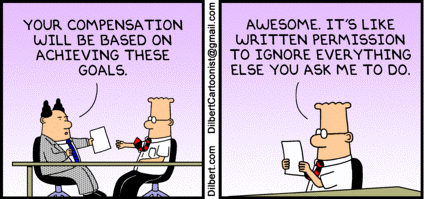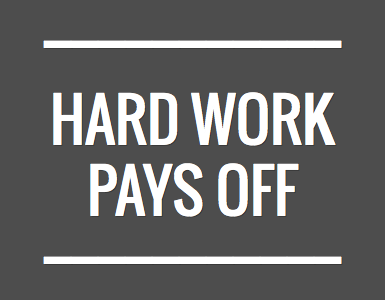Do Bonuses and Penalties Pay Off? Social Experiment on Employee Behaviour - by chrisadventures
In which case would you work harder? Receive $100,- today no matter your work effort or receive $50,- now and receive another $50,- at the end of the day dependent on your work effort? How to influence the behaviour of an employee is a topic many institutions have to face. A question that can arise here is why the employee has to be guided in the first place. Apparently, the employee's behaviour is often not in line with an employer's desires which results into a welfare loss (inefficient outcome). Therefore, either the desire or the behaviour has to be adjusted.
Together with two other students, I have inducted a social experiment and we've focused on the effect of bonuses and penalties on work effort by employees. The main question stated: "Does the provision of bonuses and penalties imposed on employees result into a significant increase of work effort by employees?" We assumed that employees want to maximize the work effort of employees while employees want to maximize their wage by taking into account the work effort. I mean, people prefer not to work 50 hours per week or focus on their work the whole day long. So, we assumed work effort to be a cost, it's limited in a way and tends to be minimized to a certain extent.

Set-Up
We had 40 players (N=40) in our computer simulation. 20 were assigned to be employers and 20 assigned to be employees. We created three major settings (each consisting of 5 playrounds), with each different rules to play by. The employers were to set up a contract with the amount of wage a worker could get and an expected worker’s effort. The worker’s effort defined the employer profit. The workers were to respond by contributing a certain work effort. The worker could accept the contract, so that he could get the proposed payment, or decline, so that nobody got a profit/payment. If accepted, the workers had to choose how much effort the worker would put in his work. The higher the effort the higher the costs to the employee and the higher the profit of the employer. Both employer and worker have an incentive to maximise their own profit, because the higher the cumulative profit (of all rounds) of the participant, the higher the real life payment which we assigned to the three participants with the highest cummulative outcome.
Setting 1 consisted of contracts without penalties and bonuses and each round workers were employed to a different employer.
Setting 2 was the same as round 1, but this time workers were randomly assigned to the same employer for all the five rounds.
Setting 3 consisted of contracts with penalties and bonuses and this time workers and employers were assigned and coupled for all five rounds.
Take into account that trust plays a strong role because once the contract was offered and accepted the wage will be paid despite the chosen worker's effort by the employee.
Example

Setting 1 and 2:
Payoff worker: wage - worker cost of effort.
Payoff employer: employer value of effort - wage.
Setting 3:
Payoff worker: wage + bonus - worker cost of effort - penalties.
Payoff employer: employer value of effort + penalties - bonus - wage.
If we look at figure 1, an employee might have been offered a contract in round 1: expected worker's effort: $8,- and offered wage: $45,-.
If the worker accepts the contract and puts in work effort 8 then
The worker earns: $45 - $13 = $32 and the employer earns $80 - $45 = $35. This would be an efficient outcome resulting into the highest welfare to both actors.
But individually seen, it's attractive to choose work effort 1 because then: the worker earns: $45 - $0 = $45 and the employer would earn $10 - $45 = -$35,-. This is inefficient.
Findings
We found that the worker's effort is higher in cases where bonuses and penalties are in place.

- Trust and reputation play a strong role in work effort. In the case were workers were assigned to the same employer for all five rounds, they tended to choose way higher work effort because it's important to have a good reputation to receive good future contracts and high future payoffs. In the case of bonuses and penalties, the employers also gave the agreed bonus if workers lived up to the expected worker's effort. If not, the worker wouldn't trust getting the bonus in later rounds and respond by giving low effort (which is negative to both parties). A peculiar thing is the performance in round 5. This was way lower because the performance of either employers (bonuses, penalties) or employees in round 5 had no effects on future payouts. This resulted in distrust and egoism. This led to inefficient outcomes.
- Bonuses and penalties positively affect payoffs because the chosen worker's effort will be punished in case workers don't live up to the expected work effort. The employer will simply not give the agreed bonus or give a penalty.
Conclusion
In our nature we're all profit and utility maximizing. As long as our effort does not influence our payoffs and nobody notices how we perform, we tend to be lazy in a way. We wouldn't perform to the highest potential because there's a cost if we do so. High work effort, long working days or highly physical work result into a sort of loss. Without the right motivation our self-interest results into inefficient outcomes. But the right motivation can be created by a win-win situation. I'm not saying that this should be money at all times but a reward or punishment will motivate workers to live up to certain expectations. So, if you're looking to maximize your potential outcomes, take these findings into account and value the role of trust, reputation and your chosen work effort. Hard work and living up to the employer's expectations pays off and results into the highest welfare outcomes!

Bonuses definitely work when the employee can control the outcome - in other words where there is a close correlation between extra work and a bonus.
If they can't control the outcome bonuses cease to work. I used to work for a company that based it's bonus on the share price at the end of the financial year. Of course we had zero ability to effect it. So the first year, everyone worked hard believing that we were affecting the company profits, and hence the share price. The profits rose, share price didn't (I think at the time Wall Street were downgrading all companies in that sector), and because of that, the bonus was small. Guess what the employee effort was in the following year?
Good study, are you planning on repeating it with a different sample? One of the best TED talks on employee motivation is by Dan Pink.
http://www.ted.com/talks/dan_pink_on_motivation?language=en
We might will, it's an interesting subject to optimize outcomes for both parties. This research has been quite limited as real life situations may be a bit different than this simulation. In the future we might need to restructure the test to make it more representative for real life situations. Anyways, I believe the outcomes are applicable anyways! So... maybe we will:-)
Extrinsic motivation (by giving bonuses) can crowd out intrinsic motivation. Hence, it should only be used when the additional extrinsic motivation overcompensates the loss of intrinsic motivation. That is most often the case when there is no or not much intrinsic motivation, for example, at assembly lines.
And this is why communism fails.
Good ! work, hope to see more !
Didn't you mean to say " We assumed that Employers want to maximize the work effort of employees while employees want to maximize their wage by taking into account the work effort." ?? or am i missing something ?...
Yep, well read, you're right haha. I've had a difficult time distinguishing 'employers' and 'employees'! More stuff will definitely come. You might like these other articles too:
https://steemit.com/money/@chrisadventures/take-a-risk-the-risk-averse-mind-behind-decision-making-on-steemit-by-chrisadventures
https://steemit.com/money/@chrisadventures/money-inequality-matters-is-it-actually-good-or-bad-by-chrisadventures
perhaps when messaging is implemented we can have some chats, being the former owner of a cpl businesses and of course being an employee for most of my 55 yrs. even if you own a company, you are still an employee. With true empathy one can come to conclusions in productivity and prosperity. I look forward to more conversation if you are so inclined. +1 of course and followed, interesting read !
This post has been linked to from another place on Steem.
Learn more about linkback bot v0.3
Upvote if you want the bot to continue posting linkbacks for your posts. Flag if otherwise. Built by @ontofractal